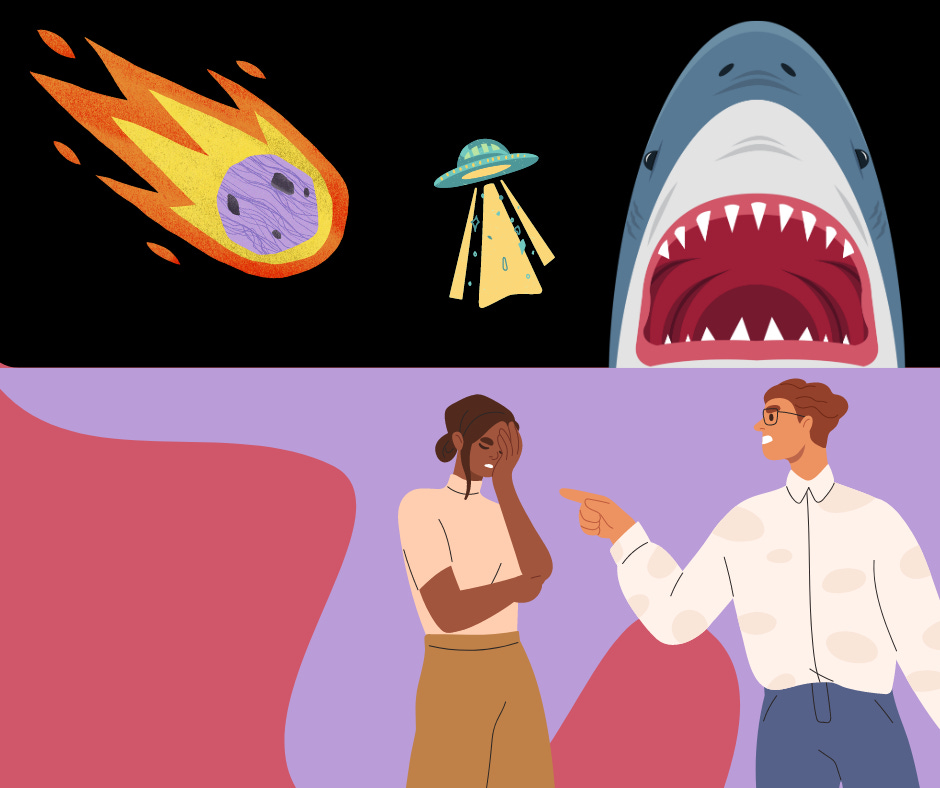It’s a balmy autumn evening and you’re getting ready for a blind date. You’re typically opposed to the concept of a blind date but this one has been arranged by your close friend, Mindy, whose judgment you trust entirely. She’s already filled you in on the guy, a new co-worker of hers—attractive, intelligent, reads poetry, and has a dark sense of humor. Check, check, check. You slip your little purse over your shoulder and head to the restaurant.
Pushing through the heavy glass door, you find yourself in an intimate French bistro. A man dressed in the clothes your friend described to you sits alone at a two-top, his face obscured by a menu. As you approach his table, he sets the menu down. You stall, your legs going wobbly beneath you.
It’s Jamie. Your best friend from childhood and first love. The summer before you both left for college, you had an awful fight. That was ten years ago. You have not seen or spoken to each other since.
And of course he recognizes you.
Flustered, you spin on your heel to flee when you see a dozen police cars parked in front of the restaurant. The manager announces to the dining room that someone was shot and the perp is still at-large. In short: you cannot leave.
You reluctantly sit across from Jamie, your nerves abuzz. But then he makes a joke, tops your wine glass, and you remember the Jamie of your past.
Soon, you two are chatting like nothing has changed, like there isn’t a crime scene a few feet away. You remember how you used to run through the woods by your house, how terrible you both were at every sport in P.E, preferring to sit off to the side. You recall how much you love the sound of his deep laugh.
You notice a beautiful dark-haired woman watching you from the corner of the room. Her expression is inscrutable. Jamie’s features twist with panic. You say, what? But it’s too late. The woman is already at your table. She introduces herself as Jamie’s wife.
Jamie opens his mouth to speak when the woman, his wife, reaches for something in her waistband. A gun? No, it can’t be a gun. You’re just rattled, the wine sharpening your fear. You don’t have a chance to find out before an officer tackles her to the ground, tightening handcuffs around her wrists.
A gun slips from her waistband.
Jamie goes pale. All he says is, I don’t know how she found me.
This, my friends, is tension.
Consider the last time you didn’t finish a novel or turned off a T.V series mid-episode. This happens for a number reasons, but one of the top ones is we no longer care what happens next.
Tension in a story is what makes you curious, it’s what makes you wonder, with force and investment, where all this is going. It’s about what could happen. This is where it accumulates its power, inside the possibilities it presents. And these possibilities most often arrive in a flurry of questions that are answered at some point during the story like, WAIT, the blind date is her ex-bff and first love? Yes. Omg, is she going to go through with the date or leave? She stays. But wait, now there’s all these police cars outside, what’s happening? we don’t know yet but it doesn’t seem good. Oh, but now she and Jamie are laughing and having a good time, the date is going well, all is good. nope, no it’s not. Wait there’s a woman approaching them, who is she? Apparently, his wife. WTF! And so on.
It’s like juggling: you always want some balls up in the air and some in your hand. The timing of this act either elevates or drains tension from the narrative. Tension arises when there is more than one possible (narratively satisfying!!!) outcome.
If there’s only one obvious possibility, then there’s no tension, like: a super smart, top of her class high schooler gets an A+ on her chemistry exam. Okay, cool. You know what would add tension to this premise? Her super hot but also super smart ex/academic rival scores an A+++ on THEIR chemistry exam. This is after they’ve made a bet—whoever scores the highest on the chem exam gets to apply to Harvard because, well, they can’t both apply and risk spending another FOUR YEARS in the same vicinity.
Everybody say it with me: tension.
This example gets at stakes as well (another topic for another post). But stakes are what a character stands to gain or lose by the end of a story. You can almost never have meaningful tension without something at stake.
Let’s stick with this Y.A lovers-to-rivals example I just made up because I love it so much. We’ll name our two overachievers Callie and Sasha.
Callie has lost the bet and can longer apply to Harvard. Fine. Columbia is also on her list. She applies, gets accepted and, by the fall, has all but forgotten about her dream of attending Harvard and that dumb bet with her evil super hot ex. And she’s excited for college, for the independence it’ll afford her, and to be in New York (New York!). She’s especially excited for Chemistry 141.
But when Callie walks into the grand lecture hall, she spots a mane of bright curly red hair at the front of the classroom that could only belong to one person. Turns out Sasha didn’t get into Harvard after all.
You can also think of tension as putting pressure on the character. One of the ways you maintain tension is by smartly subverting our expectations.
Emphasis on smartly. If the woman in the blind date story turned up to the restaurant only to realize she’d been set up with….her fourth grade teacher, that’d be weird. Yes, our expectations would be subverted, but it’s not a subversion we know what to do with the way we intuitively understand the meaning of bumping into an estranged lover. That’s unless that fourth grade teacher did something bad to her, and this is information we already have. That single choice puts us inside an entirely different story.
Let’s take a quick look at the insane graphic I made for this post using Canva, reposted below for your convenience:
This picture is stressful. Why? For one, our minds are cycling through possible outcomes: is this poor women going to get hit by a meteor? Abducted by aliens? Attacked by a shark? Attacked by this man? Or maybe the man inadvertently saves her: so fed up with his bullshit, she storms away and the shark snags him instead (we love a twist!!). It’s also stressful because neither of the characters seem aware of the imminent threats coming towards them. This funnels back into the art of timing, how and when you offer versus withhold information from the reader, the characters, or both. Tension is all about timing, who knows what, when. Also how they acquire this information can be a source of tension, too.
A disclaimer: You can absolutely overdo it with tension depending on your genre and the expectations attached to it. If the first story with Jamie, the childhood bff and first love, was a romance, we could scrap the part about the police and the murderous wife. It would be enough that our protagonist turns up to a date and finds a man from her past. But if we were writing a thriller, keep the narrative tension as is and add another plot point: the close friend, Mindy, who arranged the date calls our heroine as she’s getting into Jamie’s car. In a frayed voice, she says: “Don’t go on the date with Jamie tonight. I was going through his things at work, and he isn’t who he says he is.”
I’m a chronic D.N.F, the queen of turning a show off, of tossing a book to the side—I be bore okay. And yet I didn’t understand narrative tension until I was midway through writing my fourth novel. A lack of tension often plagues the pages of early work in part because it doesn’t seem to be taught the way dialogue, for example, is taught. I don’t think I so much as heard the word tension in any of my writing workshops1. I think sometimes it gets rolled into lessons on plot, but really it’s deserving of its own class. It’s the thing, after all, that makes us want to get to the end.
After his ex-wife is arrested and the perp is taken into custody, Jamie and our heroine2 decide they’ve had enough of the French bistro and take a walk along the canal. The sun slips behind the trees, the hours pass like quicksand. Our heroine can’t even recall why she and Jamie stopped speaking at all. He’s intelligent, funny and kind. They stop at the bridge’s crest where Jamie cups her cheek. He leans in when our heroine’s phone rings. She pulls it from her pocket. MINDY. When she answers, Mindy’s voice is frayed and urgent, but before our heroine can make out her words, she loses her balance, the landscape falls away, the sky suddenly beneath her. And all she hears is a deep laugh3.
I know this is a whole POV slip. We started in second person, now we’re in third. Sigh. That’s a whole other essay.






